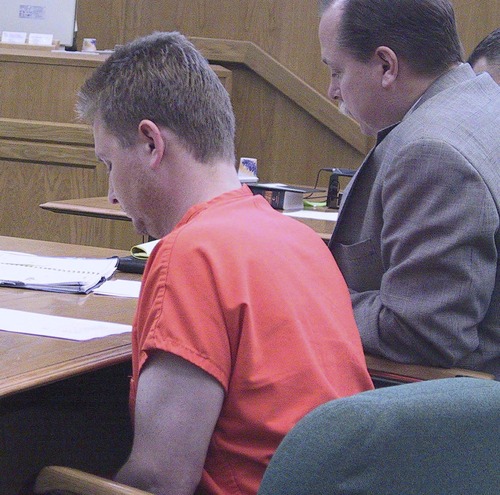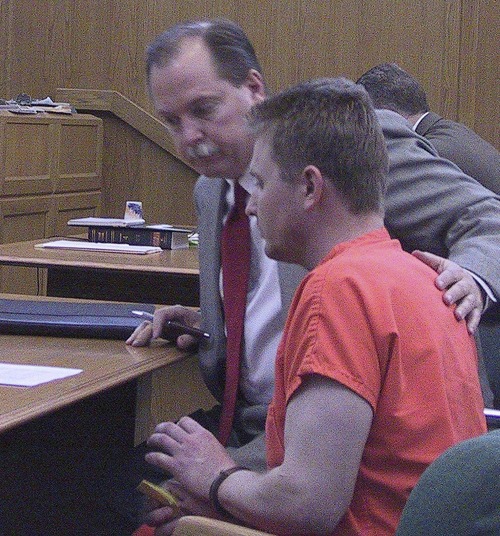This is an archived article that was published on sltrib.com in 2013, and information in the article may be outdated. It is provided only for personal research purposes and may not be reprinted.
The attorney waited until he was alone in the room with his client. He laid out the options, explained how much time he or she could spend behind bars. He said he could help — for a price.
According to court documents, that's how former Garfield County public defender John E. Hummel, 54, did business with at least seven clients in 2008 and 2009. He demanded money, firearms, electronics, anything of value in exchange for legal representation, the documents state.
The only problem?
Hummel was already being paid by taxpayers to represent those clients, all of whom were ruled indigent by the court — too poor to afford a private attorney.
On Monday, the attorney will appear in a Panguitch courtroom to stand trial for seven felony counts of theft or attempted theft by extortion. The charges could add to 65 years in prison.
Prosecutors will attempt to convince a jury that Hummel used his power and influence as an attorney to con clients.
These accusations, experts said, are extremely unusual. Most attorneys who spoke to The Tribune said they had never heard of a case like it.
But they also saidthis rare instance nonetheless highlights systemic problems with Utah's public defense system, which experts say asks attorneys to do too much for too little.
Also, unless lawyers are criminally charged or publicly reprimanded, there is no way to track this kind of corruption. Clients have little to no guidance in reporting these practices. Nor do government officials have to report public defenders they suspect of corruption to judges, or anyone else.
"Criminal defense lawyers are overwhelmingly well-intentioned and honest," said Kent Hart, executive director of the Utah Association of Criminal Defense Lawyers. "But like any other walk of life, there are going to be exceptions."
—
29 different ways • There is no formal process for reporting bad public defenders.
The body that regulates lawyers in Utah is called the Utah State Bar. It investigates and prosecutes instances of lawyer misconduct, but it can only investigate the claims it knows about.
Some accusations may never make it past the county government.
Two years ago, a rumor swept through the Washington County courthouse: an attorney was charging his indigent client for services he said were not covered by his public defender contract.
When news reached county officials, they acted quickly, removed all future clients from the attorney's calender and stopped giving him new cases, said Washington County government spokesman Dean Cox.
They also terminated his contract.
Although charging a client is a direct violation of the public defender agreement and would allow the county to fire an attorney with only a week's notice, the county instead chose to terminate the defender's contract "without cause," in which they gave him 90 days notice and never explained the reason why.
"It was the fastest and most efficient way of doing it without launching a major investigation," Cox said. "It probably would have come to the same conclusion."
Indigent clients are often unfamiliar with the legal process. They may not understand their rights or who they can turn to if they feel violated by their lawyer.
Cox said Washington County did not make any report to the State Bar. Counties are under no obligation to report ethical issues to any outside body. And, because each county handles their public defense system independently, they each have slightly different methods.
That's the problem, Hart said.
"In the absence of state oversight or enforcement standards," he said, "you're going to get 29 different ways of doing things."
—
Overworked, underpaid • Each of the 29 counties must adhere to one rule: Every person accused of committing a crime has the right to an attorney. But because not every person accused of committing a crime can afford an attorney, it falls to the counties to provide defenders.
Some, like Salt Lake and Utah Counties, have public defender offices that function like a conventional law firm with full- or part-time salaried employees charged with providing public defense services.
But most counties hire private attorneys. That means a private attorney is awarded a contract, which typically offers a flat fee in exchange for an unlimited number of public defense cases per year.
This often leads to public defenders who are overworked and underpaid, Hart said.
"Taking money from indigent clients is never understandable. You just don't do it," Hart said. "But public defenders are woefully under-compensated. The bigger problem might just be that these attorneys aren't being paid enough by the county to put what they need to into a case."
According to a 2010 report issued by the American Civil Liberties Union, public defenders in Utah receive an average of $400 per felony case and less than 10 hours to spend on each defendant. Private defense attorneys tend to receive more than $400 an hour and have far fewer clients than public defenders.
These county contracts don't take into account, Hart said, the slew of costs and responsibilities sometimes necessary for an adequate defense. That includes the amount of time it takes to resolve a case, the need to investigate crimes beyond what has already been provided by the state, and the amount of travel to courthouses or jails.
—
Naive to the system • If the allegations are true, Hummel received seven firearms, two 32-inch flat-screen televisions, two computers, an iPod, digital camera, video camera, Play Station 3, DVD player and more than $11,000 cash from seven indigent clients.
This year, Garfield County is paying its public defender $26,400.
All of Hummel's victims, court documents state, claimed to be "naive to the system and how it works." If they had known their rights, the documents state, they "never would have agreed to [Hummel's] demands."
It's not the first time Hummel's ethics have been called into question.
Hummel was elected the Kane County attorney in 2007 but served barely a month. He resigned when questions surfaced about whether Hummel actually lived in Kane County.
Hummel's trial is scheduled to last three days. Hummel could not be reached for comment. His attorney, Gary Pendleton, declined to comment Friday.
Twitter: marissa_jae —
Have a problem with your attorney?
O There is no formal process in place for reporting lawyer misconduct. Experts encourage clients to contact the Utah State Bar with concerns. Visit http://www.utahbar.org or call 801-531-9077.





